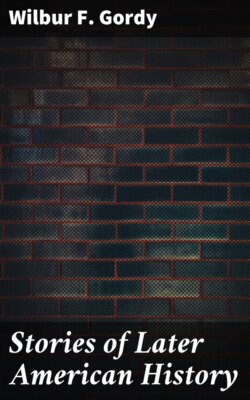Читать книгу Stories of Later American History - Wilbur F. Gordy - Страница 16
На сайте Литреса книга снята с продажи.
SOME RESULTS OF THE “BOSTON TEA PARTY”
ОглавлениеTable of Contents
The Boston Tea Party was not a festivity which pleased the King. In fact, it made him very furious. He promptly decided to punish the rebellious colony. Parliament therefore passed the “Boston Port Bill,” by which the port of Boston was to be closed to trade until the people paid for the tea. But this they had no mind to do. They stubbornly refused.
Not Boston alone came under the displeasure of King George and Parliament. They put Massachusetts under military rule, with General Gage as governor, and sent more soldiers. The new governor gave orders that the colonial assembly should hold no more meetings. He said that the people should no longer make their own laws, nor levy their own taxes. This punishment was indeed severe.
With no vessels allowed to enter or leave the harbor and trade entirely cut off, the people of Boston soon began to suffer. But the brave men and women would not give in. They said: “We will not pay for the tea, nor will we tell the King we are sorry for what we have done.”
When the people of the other colonies heard of the suffering in Boston, they sent wheat, cows, sheep, fish, sugar, and other kinds of food to help out. The King thought that by punishing Boston he would frighten the other colonies. But he was mistaken, for they said: “We will help the people of our sister colony. Her cause is our cause. We must all pull together in our resistance to King George and the English Parliament.” So his action really united the colonies.
In order to work together to better advantage, the colonies agreed that each should send to a great meeting some of their strongest men to talk over their troubles and work out some plan of united action. This meeting, which was called the First Continental Congress, was held at Carpenters’ Hall, Philadelphia (1774).
Samuel Adams and his cousin, John Adams, were two of the four men that Massachusetts sent. They began their journey from Boston in a coach drawn by four horses. In front rode two white servants, well mounted and bearing arms; while behind were four black servants in livery, two on horseback and two as footmen. Such was the manner of colonial gentlemen.
Carpenters’ Hall, Philadelphia.
As they journeyed through the country the people honored them in many ways. From some of the larger towns officials and citizens rode out on horseback and in carriages to meet them and act as escort; and on reaching a town they were feasted at banquets and greeted by gleaming bonfires, the ringing of bells, and the firing of cannon. These celebrations showed honor not to the men alone but to the cause.
The First Continental Congress, to which these messengers were travelling, urged the people to stand together in resisting the attempt of King George and Parliament to force them to pay taxes which they had had no share in laying. They added: “We have the right not only to tax ourselves, but also to govern ourselves.”
With all these movements Samuel Adams was in sympathy. He went even further, for at this time he was almost or quite alone in his desire for independence, and he has well been called the “Father of the Revolution.” Perhaps we think of him especially in connection with the Boston Tea Party, but his influence for the good of his country lasted far beyond that time.
Till the close of his life he was an earnest and sincere patriot. He died in 1803, at the age of eighty-one years. Not an orator like Patrick Henry, but a man of action like Washington, he had great power in dealing with men. Truly his life was one of great and heroic service to his country.
